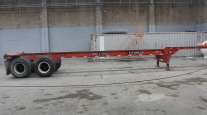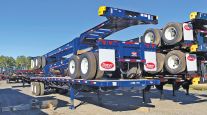Port Operators, ILA Warn Chassis Owners to Keep Using Union Labor for Repairs
This story appears in the Aug. 26 print edition of Transport Topics.
Intermodal truckers could face a new operational threat after a recent warning from port labor and management to leasing companies, the primary owners of chassis, that union workers must continue to fix and repair the equipment.
A joint letter from the International Longshoremen’s Association and the United States Maritime Alliance, representing terminal operators and some ocean carriers, said “chassis leased to truckers violate our work preservation commitment.”
They were referring to 2013 contract language that specified dockworkers at Atlantic and Gulf Coast ports would keep repairing chassis even though chassis largely are supplied now by leasing companies instead of ocean carriers. The previous contract signed in 2004 specified that ILA members would fix and maintain ocean carrier chassis in port areas.
“We have been expecting this,” said Curtis Whalen, executive director of the Intermodal Motor Carriers Conference, a part of American Trucking Associations. “We have been afraid that at some point we are going to be shut out [of cargo terminals]. We have no way of knowing whether a leasing company uses union labor or not.”
The extent of the threat isn’t clear.
The joint letter dated Aug. 6 said that after Sept. 16, chassis that truckers obtain from leasing companies wouldn’t be loaded or unloaded by dockworkers.
The issue of chassis repair is the latest in a series of transitions resulting from the ocean carriers’ gradual exit from the chassis supply business. Leasing companies such as Trac Intermodal, Flexi-Van and Direct Chassis Link have become the largest chassis providers. InterPro Advisory Principal Steve Rubin, a former leasing company CEO, earlier this year estimated an 80% leasing company ownership share by the end of 2013.
A spokesman for Trac, based in Princeton, N.J., said the company plans to keep using union labor for repairs in all terminal areas. Flexi-Van, which is based in Kenilworth, N.J., didn’t respond to requests for comment.
Another major chassis lessor is Greenwich, Conn.-based Direct Chassis Link, which was created by Danish shipping owner Maersk in 2009 as a vehicle for the company to exit the chassis business. Most other ocean carriers have since followed suit.
Direct Chassis Link, which was sold to an investor group in 2012, didn’t respond to requests for comment.
Neither the management group nor the union provided additional comment.
Some industry observers aren’t sure that problems will arise.
“They wanted to give people notice that this work is now reserved for the ILA,” said Peter Gatti, executive vice president of the National Industrial Transportation League. “I don’t know that there will be a showdown. This was simply a way for the ILA to define its role.”
Philip Wojcik, president of the Consolidated Chassis Management pool that provides chassis to truckers, said there won’t be any effect on his company’s operation because “all of our chassis fall under ILA’s [repair/maintenance] jurisdiction.”
The pool, known as CCM, was formed in 2005 as a cost-saving, equipment-sharing step by the Ocean Carrier Equipment Management Association, whose members are container lines.
Whalen said the trucker groups — the North American Chassis Pool Cooperative — also wouldn’t be affected. He did, however, emphasize the potential negative effect if the situation isn’t resolved.
Whalen said that without resolution, union members might err on the side of not handling cargo, because it’s hard to determine whether a chassis was repaired by a union member.
“If truckers are turned away from terminals, that could be cause for some sort of legal action,” Whalen said. “If I was a customer, I would sure as hell be worried about receiving my cargo.”
Even before the latest controversy, the chassis transition has presented other challenges for intermodal motor carriers.
They’ve had to cope with wrongly assigned violations by roadside inspectors because of problems implementing a 2009 regulation that was supposed to alleviate the burden of penalties for equipment they didn’t own or maintain.
Other difficulties they have encountered are heavier penalties under the federal Compliance, Safety, Accountability program and cost burdens if truckers choose to buy their own chassis.




